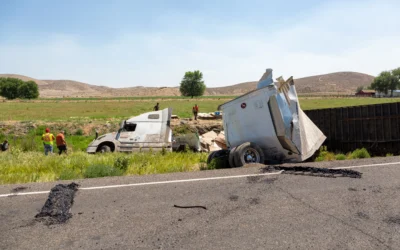What Every Driver Must Know Before Getting Behind the Wheel
Red and blue lights flashing in your rearview mirror can turn an ordinary evening into a life-changing moment. You pull over, heart racing, as the officer approaches your window. After a brief conversation, they ask you to step out of your vehicle for some “coordination tests.” What happens next could dramatically impact your future, your job, and your freedom.
Most Nevada drivers don’t fully grasp their rights during these roadside encounters. Field sobriety tests remain one of the most misunderstood aspects of DUI enforcement, and the split-second decisions you make during these tense moments can determine whether you walk away or face serious criminal charges.
What Are Field Sobriety Tests and Why Do Officers Use Them?
Field sobriety tests are physical and mental exercises that law enforcement uses to assess whether a driver might be impaired by alcohol or drugs. These tests happen on the side of the road during traffic stops, often under stressful conditions with passing traffic and bright headlights adding to the pressure.
Here’s what many people don’t realize: in Nevada, you’re not required by law to participate in field sobriety testing. This voluntary nature sets these tests apart from chemical tests like breathalyzers or blood draws, which fall under Nevada’s implied consent laws.
Police officers use these tests to gather evidence of impairment and establish probable cause for a DUI arrest. However, numerous factors beyond alcohol consumption can affect your performance. Medical conditions, medications, fatigue, anxiety, poor weather conditions, and uneven road surfaces can all cause you to fail these tests even when you’re completely sober.
The Three Tests Nevada Officers Will Ask You to Perform
Nevada uses three standardized field sobriety tests approved by the National Highway Traffic Safety Administration (NHTSA). Each test has specific instructions and scoring criteria that officers must follow for the results to be admissible in court.
The Eye Test (Horizontal Gaze Nystagmus)
The officer will ask you to follow a moving object, usually a pen or small flashlight, with your eyes while keeping your head still. They’re looking for involuntary jerking movements in your eyes that can indicate alcohol impairment.
During this test, the officer moves the object slowly from side to side while watching for three specific indicators in each eye. While this test is considered the most scientifically reliable of the three, certain medical conditions, medications, or even fatigue can affect the results.
The Walk-and-Turn Test
This test requires you to take nine heel-to-toe steps along a straight line, turn around in a specific manner, and take nine heel-to-toe steps back. The officer watches for eight specific indicators of impairment, including starting too soon, losing balance, taking the wrong number of steps, or failing to walk heel-to-toe.
The test challenges your ability to follow instructions while performing physical movements that require balance and coordination. Age, weight, injuries, inappropriate footwear, and uneven surfaces can all affect your performance regardless of whether you’ve been drinking.
The One-Leg Stand Test
You’ll be asked to stand in place with one leg six inches off the ground and count to 30 by saying “one one-thousand, two one-thousand,” and so on. The officer looks for four indicators of impairment: putting your foot down, using your arms for balance, hopping, or swaying.
This test is particularly challenging for people with balance issues, leg injuries, or those who are significantly overweight. Even factors like age or certain medications can make this test difficult to complete successfully.
Can You Refuse Field or Chemical DUI Tests?
Field sobriety tests are voluntary in Nevada. You are not legally required to take them, and officers cannot penalize you directly for refusing. However, refusing these tests comes with potential consequences worth considering:
Possible arrest. If you refuse field sobriety tests, the police officer may treat your refusal as evidence supporting probable cause for arrest. Officers might interpret your refusal as consciousness of guilt, though this assumption isn’t always legally valid.
Court considerations. While prosecutors cannot use your refusal as direct evidence of guilt, they may present it as circumstantial evidence. However, there are many valid reasons why someone might refuse these tests that have nothing to do with impairment.
No direct legal penalties. Unlike chemical test refusal, there are no automatic license suspensions or fines for refusing field sobriety tests in Nevada.
When making this decision, remember that field sobriety tests are designed to be difficult even for sober individuals. The tests are typically conducted under stressful conditions, often at night with poor lighting and traffic noise. Many people fail these tests for reasons completely unrelated to alcohol consumption.
Understanding the Difference Between Field and Chemical Testing
It’s vital to understand the difference between field sobriety tests and chemical tests because Nevada law treats them very differently. Chemical tests like breath, blood, or urine tests fall under Nevada’s implied consent law found in NRS 484C.160.
Under Nevada’s implied consent law found in NRS 484C.160, by driving on Nevada roads, you automatically consent to chemical testing if lawfully arrested for DUI. If you refuse chemical testing, officers have the right to obtain a warrant and potentially use reasonable force to obtain a blood sample.
The consequences of refusing chemical tests are severe and include automatic license revocation of one year for first-time refusals, fines, and the possibility that your refusal can be used against you in court. In contrast, field sobriety tests remain voluntary, and while there are no direct legal penalties for refusing them, officers may still use your refusal as evidence when determining probable cause for arrest.
Why These Tests Often Produce Unreliable Results
Field sobriety tests are far from perfect. As DUI defense attorneys, we’ve seen countless cases where these tests produced misleading results that had nothing to do with alcohol impairment.
Medical Conditions That Affect Performance
Many medical conditions can impair your ability to perform field sobriety tests successfully:
- Inner ear problems or balance disorders
- Leg, knee, or ankle injuries
- Back problems or spinal issues
- Neurological conditions
- Vision problems
- Diabetes or other metabolic disorders
Environmental Factors
The conditions under which these tests are administered can significantly impact results:
- Uneven or slippery road surfaces
- Poor lighting conditions
- Bad weather
- Heavy traffic creating noise and distraction
- Inappropriate footwear for the conditions
Officer Training and Administration Errors
For field sobriety tests to be admissible in court, officers must administer them according to strict NHTSA guidelines. Common administration errors include:
- Failing to provide proper instructions
- Not demonstrating the tests correctly
- Testing on unsuitable surfaces
- Rushing through the instructions
- Failing to account for the driver’s physical limitations
What You Should Do During a Traffic Stop
If you’re pulled over and an officer suspects you of DUI, here’s what you need to know:
- Stay calm and be polite. Remain respectful throughout the encounter. Provide your driver’s license, registration, and insurance when requested.
- Exercise your right to remain silent. You have the right to remain silent beyond providing basic identification. You don’t have to answer questions about where you’ve been or whether you’ve been drinking.
- Think carefully about your options. Remember that field sobriety tests are voluntary in Nevada. Consider your physical condition, the environmental factors, and your comfort level with performing these tests.
- Don’t resist if arrested. If you’re arrested, do not resist or argue with the officer. Save your defense for the courtroom where it can be properly presented.
- Contact an attorney immediately. The sooner you contact a DUI defense attorney, the better your chances of building a strong defense.
How We Challenge Field Sobriety Test Results in Court
Just because you performed poorly on field sobriety tests doesn’t mean you’re automatically guilty of DUI. These tests can be challenged in court through various legal strategies:
Questioning Test Administration
We examine whether the officer properly administered the tests according to NHTSA standards. Any deviation from proper procedures can make the results unreliable and potentially inadmissible.
Medical Evidence
If you have medical conditions that could affect your performance, we can present medical evidence to explain your test results. This might include medical records, doctor testimony, or demonstrating how your condition impacts your ability to perform these tests.
Environmental Challenges
We can argue that environmental conditions made the tests unreliable. This might include evidence about road conditions, weather, lighting, or other factors that could have affected your performance.
Officer Training and Qualifications
We investigate the arresting officer’s training and qualifications in administering field sobriety tests. If the officer lacked proper training or certification, this could impact the reliability of the results.
Why People Fail These Tests When They’re Sober
Many factors besides alcohol consumption can cause someone to perform poorly on field sobriety tests:
- Fatigue. Being tired can significantly impair your balance and coordination, leading to poor test performance that mimics alcohol impairment.
- Anxiety and stress. The stress of being pulled over and asked to perform tests in front of traffic can cause even sober individuals to make mistakes.
- Medications. Many legal prescription and over-the-counter medications can affect balance, coordination, and cognitive function.
- Age and physical fitness. Older adults or those with limited physical fitness may struggle with these tests regardless of their sobriety.
- Footwear and clothing. High heels, flip-flops, or restrictive clothing can make it difficult to perform these tests successfully.
The Science Behind Field Sobriety Tests
While field sobriety tests are widely used, their scientific validity has been questioned by researchers and legal scholars. The original NHTSA studies that validated these tests were conducted under controlled laboratory conditions, which differ significantly from real-world roadside conditions.
Research has shown that these tests have accuracy rates ranging from 65% to 77% when properly administered, meaning that a significant percentage of people who fail these tests are not actually impaired. This error rate becomes even higher when tests are administered improperly or under poor conditions.
The scoring of these tests can also be highly subjective. What one officer considers a “failure” might be interpreted differently by another officer, leading to inconsistent results and potential challenges in court.
How Legal Representation Can Help Your Case
If you’ve been charged with DUI based on field sobriety test results, having experienced legal representation is essential. A skilled DUI attorney can:
- Analyze the circumstances of your arrest and test administration
- Identify potential constitutional violations or procedural errors
- Gather medical evidence to explain poor test performance
- Challenge the reliability and admissibility of test results
- Negotiate with prosecutors for reduced charges or alternative sentencing
- Represent you at trial if necessary
Every DUI case is unique, and the specific circumstances of your arrest and test administration can significantly impact your defense strategy. What works in one case may not apply to another, which is why personalized legal analysis is so important.
Understanding Nevada’s DUI Laws and Penalties
Nevada has strict DUI laws with severe consequences for those convicted. Understanding these laws can help you make informed decisions about field sobriety tests and other aspects of your case.
Nevada operates under a “per se” law, meaning you can be charged with DUI if your blood alcohol concentration (BAC) is 0.08% or higher (0.02% for drivers under 21), regardless of whether you appear impaired. However, you can also be charged with DUI if you’re impaired by alcohol or drugs, even if your BAC is below the legal limit.
The penalties for DUI in Nevada are severe and include:
First Offense:
- Administrative license revocation of 90 days (can be reduced to 45 days with alcohol treatment)
- Criminal penalties upon conviction may include additional license suspension
- Fines ranging from $400 to $1,000
- Possible jail time of 2 days to 6 months
- Mandatory DUI education program
Second Offense (within 7 years):
- Administrative license revocation of one year
- Enhanced criminal penalties
- Mandatory ignition interlock device
Third Offense (within 7 years):
- Felony charges
- Substantial prison time
- Permanent license revocation possible
It’s important to note that these penalties can vary based on specific circumstances, and administrative penalties from the Nevada Department of Motor Vehicles occur separately from criminal court proceedings.
Recent Legal Developments and Important Distinctions
Nevada courts have issued several important decisions regarding field sobriety tests in recent years. These decisions have clarified when these tests can be used as evidence and how they should be administered.
Recent court decisions have reinforced that while Nevada drivers must submit to chemical testing after a DUI arrest under NRS 484C.160, there is no legal requirement to submit to field sobriety tests. This distinction is important for drivers to understand their rights during traffic stops.
It’s also important to distinguish between preliminary breath tests (PBT) conducted roadside and formal chemical tests conducted after arrest. PBTs are generally considered voluntary screening tools, while formal chemical tests at the police station or medical facility fall under Nevada’s implied consent law.
Important Legal Disclaimer: DUI laws change frequently, and court interpretations continue to evolve. The information provided here is based on current understanding of Nevada law as of 2025, but you should always consult with a qualified DUI attorney for the most current legal advice specific to your situation.
Key Takeaways
- Field sobriety tests are voluntary in Nevada and you have the right to refuse them
- Refusing field sobriety tests may lead to arrest but cannot be used as evidence of guilt in court
- These tests are designed to be difficult and many factors besides alcohol can cause poor performance
- Medical conditions, environmental factors, and officer errors can all affect test results
- Chemical tests (breath, blood, urine) are different from field sobriety tests and fall under Nevada’s implied consent law
- Poor performance on field sobriety tests doesn’t guarantee a DUI conviction
- Experienced legal representation can help challenge test results and build a strong defense
- The decision to take or refuse these tests should be made carefully, considering your individual circumstances
Frequently Asked Questions
If I refuse field sobriety tests, will I automatically be arrested? Not necessarily. While refusing these tests may give the officer additional suspicion, they still need probable cause to arrest you. However, officers may interpret your refusal as suspicious behavior and look for other evidence of impairment.
Can I request to take the tests at the police station instead of on the roadside? No, field sobriety tests are specifically designed to be administered at the location of the stop. Chemical tests like breathalyzers or blood draws are typically conducted at the police station or medical facility.
Are there any field sobriety tests I should take and others I should refuse? All three standardized field sobriety tests are voluntary in Nevada. However, some people feel more comfortable with certain tests than others. The decision is ultimately yours, but remember that any test you take can potentially be used as evidence against you.
What happens if I have a medical condition that affects my balance? You should inform the officer of any medical conditions that might affect your performance. However, the officer may still ask you to attempt the tests or may arrest you based on other evidence. Having medical documentation can be helpful for your defense later.
Can I be charged with DUI if I pass the field sobriety tests? Yes, you can still be charged with DUI even if you pass field sobriety tests. These tests are just one piece of evidence, and officers may rely on other factors like your driving pattern, appearance, or chemical test results.
How long do I have to decide whether to take the tests? There’s no specific time limit, but officers typically expect a fairly quick decision. Take a moment to consider your options, but don’t delay excessively as this could be viewed as suspicious behavior.
Can the results of field sobriety tests be thrown out of court? Yes, in many cases, field sobriety test results can be challenged and potentially excluded from evidence. This typically happens when tests are administered improperly, under poor conditions, or when medical factors explain poor performance.
Contact Joey Gilbert & Associates Today
If you’ve been charged with DUI in Nevada, don’t face these serious charges alone. The decisions you make in the hours and days following your arrest can significantly impact the outcome of your case.
At Joey Gilbert & Associates, we have extensive experience defending clients against DUI charges throughout Nevada. We’ll thoroughly analyze your case, challenge any questionable evidence, and fight tirelessly to protect your rights and your future.
Time is critical in DUI cases. Evidence can be lost, witnesses’ memories can fade, and important deadlines can pass. The sooner you contact us, the better we can protect your interests and build a strong defense.
Your future is too important to leave to chance. Contact Joey Gilbert & Associates today to schedule your consultation and take the first step toward protecting your rights and your freedom. We’re here to help you through this difficult time and fight for the best possible outcome in your case.




